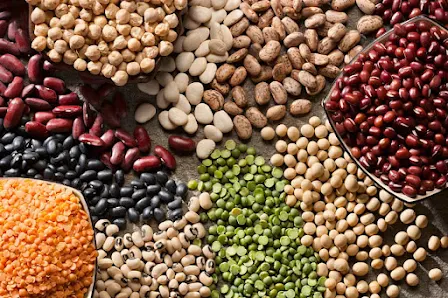8 Unknown Health Benefits of Beans that You are Yet to Know
Beans are the largest part of the legume family, which include among others, peas, lentils, peanuts, soybeans, and also alfalfa. They are an inexpensive source of protein, fiber, and vitamins, which offer many health benefits. Studies have shown that there are so many varieties of beans that you can actually be spoilt for choice. It may take a little time to see which beans are suited to individual tastes, but beans can be added to soups, salads, casseroles, and meat dishes for an interesting taste experience.
- Lima beans.
- Black beans
- soybeans.
- Kidney beans
- Cranberry beans.
- Cannellini Beans.
Most beans have very similar health-promoting benefits, and are especially high in antioxidants, low in fat, and contain no cholesterol.
Trace minerals in beans essential for good health include zinc, manganese, magnesium, and iron. Beans are also very high in B vitamins like B1 (thiamine) needed to help metabolize food into energy and B9 – which is folate, necessary for forming DNA, and also helps to prevent certain kinds of birth defects.
Beans contain a high amount of vegetable proteins, which are actually not complete proteins on their own. This means that they lack a certain amino acid that you can only get from meat, fish, poultry, and dairy products. It is important to note that if you combine eating beans with any meat, fish, or poultry dishes, as well as dairy products such as milk, cheese, or yogurt – the beans immediately become a complete protein that is needed by the body.
Unknown Health Benefits of Beans that You are Yet to Know
By adding beans to your diet, you can expect the following health benefits.
Free radicals which rampage around in the body damaging organs are effectively controlled and eliminated by antioxidants, which are prolific in beans. The antioxidant and anti-inflammatory qualities in beans also help to slow down the aging process and prevent cancer.
Soybeans support the healthy functioning of the pancreas cells, which assists the pancreas in effectively producing insulin that regulates blood sugar. (How To Reverse Type 2 Diabetes)
7. Trace minerals. Beans have high levels of minerals which are necessary for good health. Included are minerals such as calcium, needed for healthy bones and blood clotting, magnesium for muscle and nerve function, and iron to prevent anemia and promote the formation of red blood cells.
Studies and research have indeed provided evidence that beans are among the most nutrient-dense foods available in nature.
Add Beans To Your Diet For Amazing Health Benefits
Safety tips for eating beans
Beans do not have any side effects, but there are a couple of factors to note when eating beans:
- Make sure that you are not allergic to beans or other legumes. Bear in mind that if you are allergic to one type of bean, then you are more than likely to be allergic to others. Peanuts which are part of the legume family, are common allergens – as are soybeans. It would be better to avoid beans if you are prone to allergies, or perhaps consider allergy-testing.
- Always cook beans before eating. Some beans contain a certain protein known as lectin which interferes with digestion and may cause food poisoning. When beans are cooked, lectin is destroyed, and beans can be safely eaten.
- Some folk suffers gas or a little intestinal disturbance when eating beans. This is not dangerous, and a digestive enzyme bought over-the-counter will help tremendously.
- Adding beans to your diet will help you to get healthy and keep healthy – all due to the amazing health benefits of the humble bean.
References:
www.beaninstitute.com
www.nytimes.com











